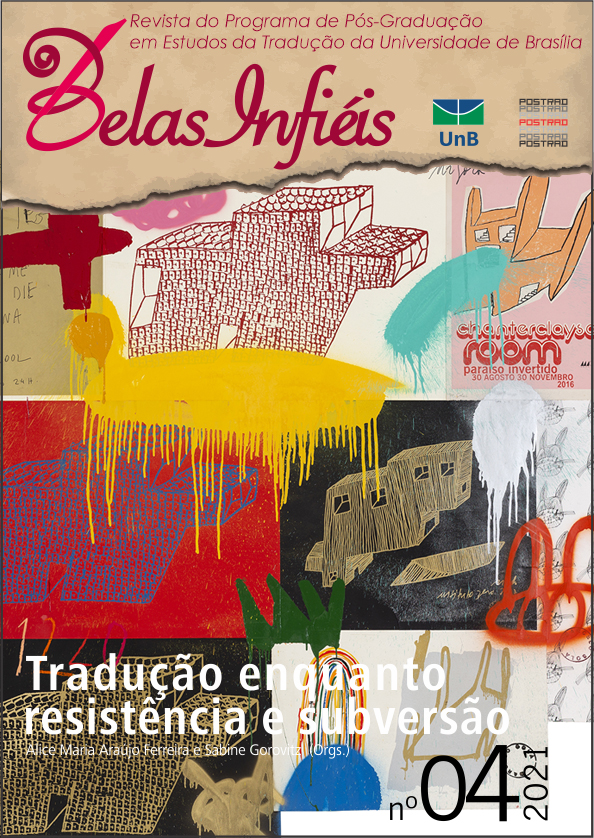Teorias sem casa, textos sem pátria: reflexões sobre língua e tradução a partir de Homi Bhabha
DOI:
https://doi.org/10.26512/belasinfieis.v10.n4.2021.36264Palabras clave:
Tradução. Língua. Nação. Pós-colonial. Globalização.Resumen
O presente artigo parte do pressuposto de que a tradução feita hoje precisa levar em conta aspectos culturais e históricos de maneira mais expressiva e tem como objetivo, a partir de um arcabouço teórico cindido entre os estudos pós-coloniais e os tradicionais estudos de tradução, propor uma discussão sobre a necessidade de uma presença mais clara do tradutor e os processos linguísticos envolvidos na publicação de uma obra teórica. Quais são as relações que se ocultam em uma atividade tão antiga quanto a suposta correspondência e a equivalência entre os idiomas e por que cabe à Literatura Comparada se ocupar de tais questões? De que maneira o vácuo gerado pelo confronto entre as questões prementes colocadas pelo mundo globalizado poderia afetar a natureza da recepção de textos e qual a necessidade de refletirmos sobre isso? Logo, pretende-se refletir sobre esses questionamentos a partir do texto de Homi K. Bhabha, em sua obra The Location of Culture (2008) e a versão publicada em português pela editora da UFMG, ao mesmo tempo em que se mantém no horizonte a discussão sobre a circulação da teoria pós-colonial no cenário brasileiro e as tensões inerentes à atividade da tradução.
Descargas
Citas
Anderson, B. (2008) Comunidades Imaginadas: reflexões sobre a origem do nacionalismo (D. Bottman, Trad.). Companhia das Letras.
Apter, E. (2013). Against World Literature. Verso Books.
Benjamin, W. (2011). Escritos sobre Mito e Linguagem (S. Kampff Lages, & E. Chaves, Trad.). Editora 34.
Berman, A. (2007). A Tradução e a Letra ou o Albergue do Longínquo (M. H. C. Torres, M. Furlan, & A. Guerini, Trads.). 7 Letras.
Bhabha, H. K. (2001). O Local da Cultura (M. Ávila, E. L. L. Reis, & G. R. Gonçalves, Trads.). UFMG.
Bhabha, H. K. (2008). The Location of Culture. Routledge.
Coletivo de Pesquisa de Warwick. (2020). Desenvolvimento Combinando e Desigual (G. B. Zanfelice, Trad.). Editora Unicamp.
Coutinho, E. F. (2013). Literatura Comparada: reflexões. Anna Blume.
Deleuze, G., & Guatarri, F. (2014). Por Uma Literatura Menor ( C. V. da Silva, Trad.). Autêntica.
Derrida, J. (1997). Of Grammatology (G. Spivak, Trad.). The Johns Hopkins University Press.
Eco, U. (2007). Quase a Mesma Coisa (E. Aguiar, Trad.). Record.
Geary, P. J. (2005). O Mito das Nações (F. Pinto, Trad.). Conrad Editora do Brasil.
Melo, A. C. (2020). Crítica da razão nacional-ocidentalista: por uma nova abordagem pós-colonial nos Estudos Brasileiros. Alea, 22(2), 17-40. http://www.scielo.br/scielo.php?script=sci_arttext&pid=S1517-106X2020000200017&lng=en&nrm=iso
Santos, S. A., & Francisco, C. (2018). Políticas de tradução: um tema de políticas linguísticas? Fórum Linguíst.!co, 15(1), 2939-2949. https://periodicos.ufsc.br/index.php/forum/article/view/1984-8412.2018v15n1p2939
Spivak, G. (1997). Translator’s preface. In Of Grammatology (G. Spivak, Trad.). The Johns Hopkins University Press.
Descargas
Publicado
Cómo citar
Número
Sección
Licencia
Derechos de autor 2021 CC BY

Esta obra está bajo una licencia internacional Creative Commons Atribución 4.0.
Copyright Statement
Given the public access to this journal, the texts are free to use but requires the recognition of the original authorship and initial publication in this journal to be properly stated.
The journal allows the use of works published for non-commercial purposes, including the right to submit the work to publicly accessible databases. Published contributions are the sole and exclusive responsibility of the author(s).
- When submitting papers to be evaluated by the Belas Infiéis journal, the author(s):
- Declare that the contents of the contributions are original and of their original creation, being entirely responsible for their content if there is an objection by third parties.
- Claim to be aware that they should not commit academic plagiarism.
- Declare that the manuscript has not been published, completely or partially, in Portuguese or another language. If it is a translation it should be submitted to the Translated Articles section.
- Declare that the manuscript is not being evaluated by other journals.
- Declare that the manuscript was not submitted to another journal simultaneously.
- Commit(s) to inform the journal of any kind of error or inaccuracy in their contribution (published, in evaluation or in editing) and to collaborate with the editors to make due corrections of the article (when in evaluation or editing) or erratum/retraction (after publication).
- Declare that there is no conflict of interest regarding the published work.
- Authorize its release if it is accepted for publication without any kind of monetary compensation.
- Agree to assign non-exclusive rights to publication to the magazine, remaining free to make their contribution available in other media as long as the publication of the first version in Belas Infiéis magazine is mentioned. They also authorize Belas Infiéis to assign their texts for reproduction in content indexers, virtual libraries and similar platforms.
- Maintain copyright and grant the journal the right of first publication, the work being licensed under theCreative Commons Attribution License.
- Is/Are allowed and encouraged to publish and distribute their work online after the editorial process, which may increase the impact and citation of the published work.
- Authorize the editorial team to make textual adjustments and to adapt the article to the publication rules, when necessary.



















